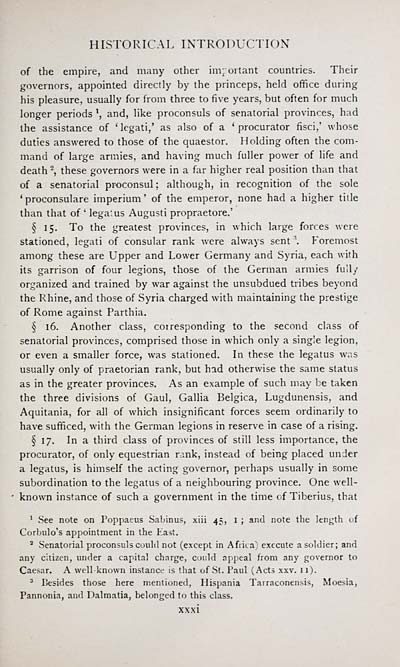Download files
Complete book:
Individual page:
Thumbnail gallery: Grid view | List view

HISTORICAL INTRODUCTION
of the empire, and many other important countries. Their
governors, appointed directly by the princeps, held office during
his pleasure, usually for from three to five years, but often for much
longer periods ', and, like proconsuls of senatorial provinces, had
the assistance of 'Icgati,' as also of a 'procurator fisci,' whose
duties answered to those of the quaestor. Holding often the com-
mand of large armies, and having much fuller power of life and
death -, these governors were in a far higher real position than that
of a senatorial proconsul; although, in recognition of the sole
' proconsulare imperium ' of the emperor, none had a higher title
than that of ' lega'.us Augusti propraetore.'
§ 15. To the greatest provinces, in which large forces were
stationed, legati of consular rank were always sent \ Foremost
among these are Upper and Lower Germany and Syria, each with
its garrison of four legions, those of the German armies full/
organized and trained by war against the unsubdued tribes beyond
the Rhine, and those of Syria charged with maintaining the prestige
of Rome against Parthia.
§ 16. Another class, corresponding to the second class of
senatorial provinces, comprised those in which only a single legion,
or even a smaller force, was stationed. In these the legatus was
usually only of praetorian rank, but had otherwise the same status
as in the greater provinces. As an example of such may be taken
the three divisions of Gaul, Gallia Belgica, Lugdunensis, and
Aquitania, for all of which insignificant forces seem ordinarily to
have sufficed, with the German legions in reserve in case of a rising.
§ 17. In a third class of provinces of still less importance, the
procurator, of only equestrian rank, instead of being placed under
a legatus, is himself the acting governor, perhaps usually in some
subordination to the legatus of a neighbouring province. One well-
known instance of such a government in the time of Tiberius, that
' See note on Poppaeus Sabinus, xiii 45, i ; and note the length of
Corbulo's appointment in the East.
* Senatorial proconsuls coukl not (except in Africa) execute a soldier; and
any citizen, under a capital charge, could appeal from any governor to
Caesar. A well-known instance is that of St. Paul (Acts xxv. 11).
'■' Besides those here mentioned, Ilispania Tarraconensis, Moesia,
Pannonia, and Dalmatia, belonged to this class.
xxxi
of the empire, and many other important countries. Their
governors, appointed directly by the princeps, held office during
his pleasure, usually for from three to five years, but often for much
longer periods ', and, like proconsuls of senatorial provinces, had
the assistance of 'Icgati,' as also of a 'procurator fisci,' whose
duties answered to those of the quaestor. Holding often the com-
mand of large armies, and having much fuller power of life and
death -, these governors were in a far higher real position than that
of a senatorial proconsul; although, in recognition of the sole
' proconsulare imperium ' of the emperor, none had a higher title
than that of ' lega'.us Augusti propraetore.'
§ 15. To the greatest provinces, in which large forces were
stationed, legati of consular rank were always sent \ Foremost
among these are Upper and Lower Germany and Syria, each with
its garrison of four legions, those of the German armies full/
organized and trained by war against the unsubdued tribes beyond
the Rhine, and those of Syria charged with maintaining the prestige
of Rome against Parthia.
§ 16. Another class, corresponding to the second class of
senatorial provinces, comprised those in which only a single legion,
or even a smaller force, was stationed. In these the legatus was
usually only of praetorian rank, but had otherwise the same status
as in the greater provinces. As an example of such may be taken
the three divisions of Gaul, Gallia Belgica, Lugdunensis, and
Aquitania, for all of which insignificant forces seem ordinarily to
have sufficed, with the German legions in reserve in case of a rising.
§ 17. In a third class of provinces of still less importance, the
procurator, of only equestrian rank, instead of being placed under
a legatus, is himself the acting governor, perhaps usually in some
subordination to the legatus of a neighbouring province. One well-
known instance of such a government in the time of Tiberius, that
' See note on Poppaeus Sabinus, xiii 45, i ; and note the length of
Corbulo's appointment in the East.
* Senatorial proconsuls coukl not (except in Africa) execute a soldier; and
any citizen, under a capital charge, could appeal from any governor to
Caesar. A well-known instance is that of St. Paul (Acts xxv. 11).
'■' Besides those here mentioned, Ilispania Tarraconensis, Moesia,
Pannonia, and Dalmatia, belonged to this class.
xxxi
Set display mode to: Large image | Transcription
Images and transcriptions on this page, including medium image downloads, may be used under the Creative Commons Attribution 4.0 International Licence unless otherwise stated. ![]()
| Early Gaelic Book Collections > Matheson Collection > Cornelli Taciti annalium > (35) |
|---|
| Permanent URL | https://digital.nls.uk/76567340 |
|---|
| Description | Items from a collection of 170 volumes relating to Gaelic matters. Mainly philological works in the Celtic and some non-Celtic languages. Some books extensively annotated by Angus Matheson, the first Professor of Celtic at Glasgow University. |
|---|
| Description | Selected items from five 'Special and Named Printed Collections'. Includes books in Gaelic and other Celtic languages, works about the Gaels, their languages, literature, culture and history. |
|---|

